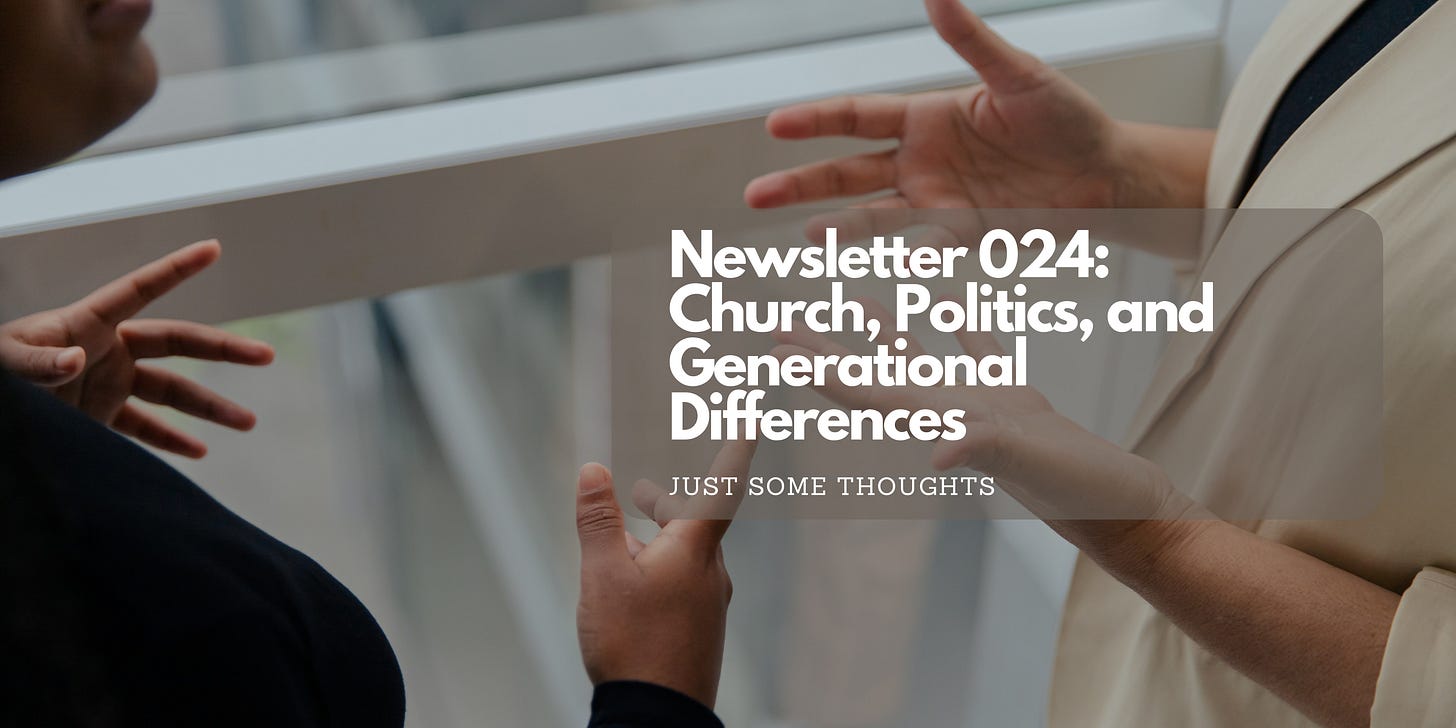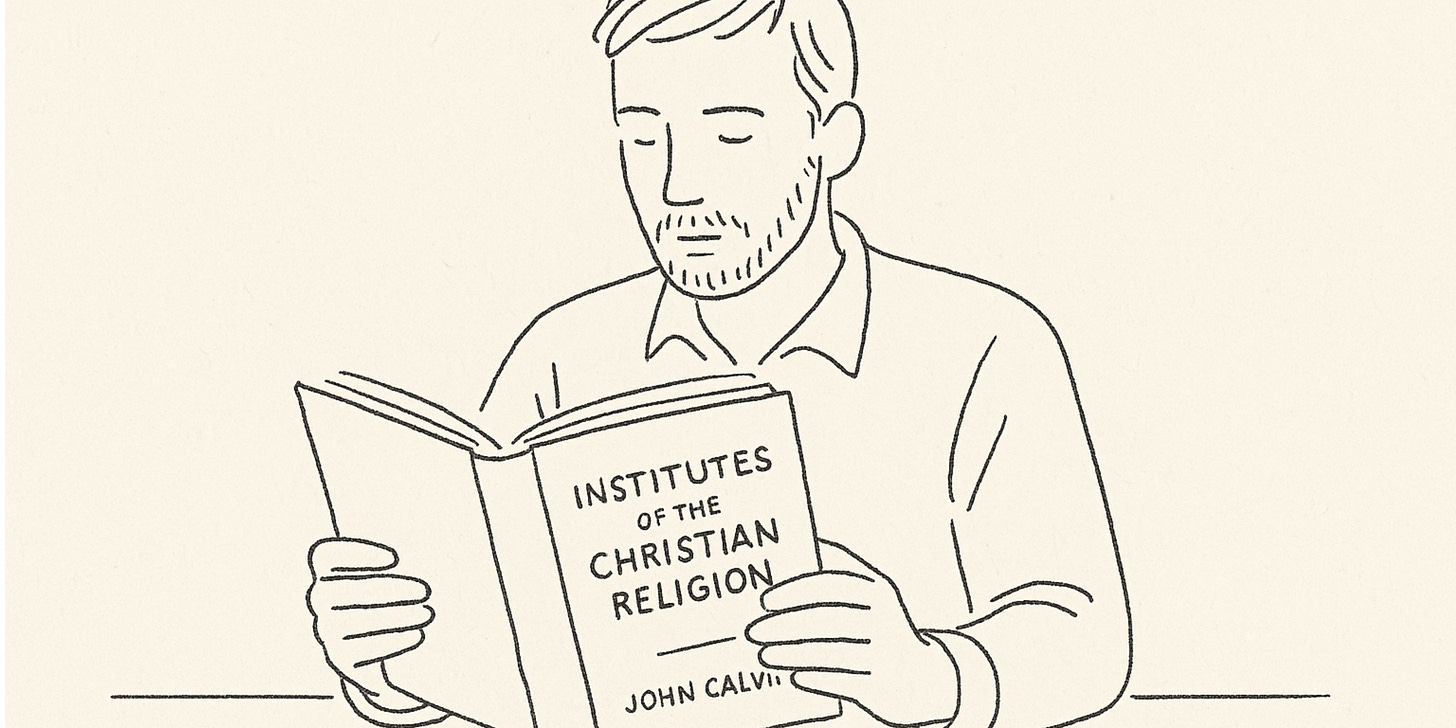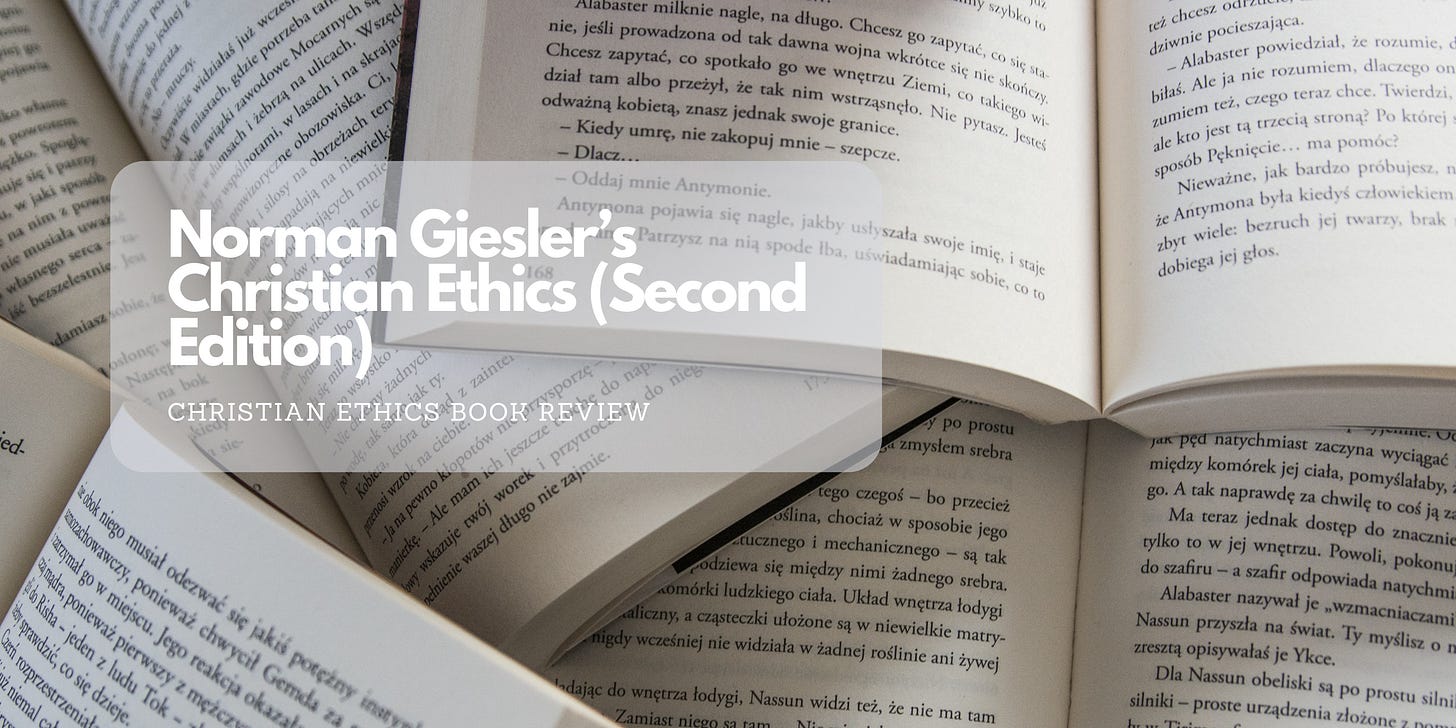Newsletter 024: Church, Politics, and Generational Differences
Along with reading Calvin, and part 1 of my Review of Norman L. Geisler's Christian Ethics
Hey,
Welcome to The Musings of Tyler Hurst where I look at issues surrounding church, culture, and technology through Christian theology, Christian philosophy, and Christian ethics. As a pastor and doctoral candidate in ethics and public theology these are important issues to me and their intersection often is missed.
Thanks for reading, hope you enjoy the thoughts,
tdh
In this newsletter I want to suggest an important point of reflection for pastors and ministry leaders on politics and the church—but…
Before we get into it,
here are five things that caught my eye…
There are all Charlie Kirk focused. His assassination is a tragic sign of where things are at in our politics today. America is very divided. However, reading numerous commentaries on it and listening to some podcasts I am very heartened by people who are able to put aside political differences to say a kind and true word.
The Honestly Podcast - Bari Weiss is one of the new breed of Neoconservatives. A Neoconservative is someone who was on the political left but got “mugged by reality” and has realigned his or her politics to match that mugging.
David Bahnsen - A conservative Christian in the politics-economics sphere comments on the Kirk and his private conversation with Kirk that is a good display of how discipleship in public settings should take place.
Warren Cole Smith - A commentator and investigative…(
reporter…journalist…?) writer on church abuse reflects similar themes to Bahnsen and especially highlights the tragedy of his youth. Kirk, by Smith’s telling, matured a lot over the decade plus of political activism. He likely would have matured more, but the political right—not to mention Charlie’s family—have been robbed of that experience and opportunity.Erik Erickson - Probably the most thoroughly Christian political commentator gives his take and perspective.
Nick Cattogio and Ezra Kline - A conservative writer who is very much on the opposite end of the spectrum from MAGA. Kline is an abundance democrat who I don’t really know what to do with. Many on the right think he is merely a weather vein—which makes his piece on Charlie quite a statement of hope.
I was at a little regional pastors’ gathering for my denomination last week. It was the day after the Charlie Kirk shooting. We went around the table—about twelve to fifteen of us in attendance—and shared a bit about life, ministry, and general mood or vibe. One pastor mentioned that he has seen some growth over the past few years which he attributed to declaring his church a politics free zone. No politics talk on the church property. There were numerous nods and noises of agreement. I didn’t mention anything at the time due to my general insecurity about my age at pastors’ get togethers—however, on reflection this group skewed younger so if we wanted to have a discussion, not the purpose of the group mind you, I probably could have gotten away with interjecting some dissension on this point.
I have become fascinated by the differences between pastors on the basis of generations. I think Gen Xers were told that politics turns a lot of people off so pastors should work really hard to be politically neutral. If they couldn’t be then the next best thing was a healthy dose of both-sides-ism. However, I am not sure that this is a sustainable position when it comes to several major political issues:
Abortion
Sexuality (i.e. homosexuality)
Gender (i.e. transgenderism, appropriate masculinity)
Freedom of speech
Each of these are, I would argue, religious, theological, and philosophical issues before they are political issues. If the church is supposed to be apolitical how does one speak about these issues? To a certain extent the answer is probably “I don’t mean apolitical, I mean non-partisan.” But each of those issue aligns—from a Christian perspective—to the same political party. Do I not implicitly promote politics by only speaking about the issues that are theological at their core? Can a church be faithful and non-political or apolitical in our world? I think the burden of proof is to prove that a church can be.
I have a bunch more thoughts but have to run to a staff meeting.
Nearly all the wisdom we possess, that is to say, true and sound wisdom, consists of two parts: the knowledge of God and of ourselves. eBut, while joined by many bonds, which one precedes and brings forth the other is not easy to discern.
John Calvin, Institutes of the Christian Religion, ed. John T. McNeill, trans. Ford Lewis Battles, vol. 1 & 2, The Library of Christian Classics (Louisville, KY: Westminster John Knox Press, 2011), 35.
I do not yet touch upon the sort of knowledge with which men, in themselves lost and accursed, apprehend God the Redeemer in Christ the Mediator; but I speak only of the primal and simple knowledge to which the very order of nature would have led us if Adam had remained upright. In this ruin of mankind no one now experiences God either as Father or as Author of salvation, or favorable in any way, until Christ the Mediator comes forward to reconcile him to us.
John Calvin, Institutes of the Christian Religion, ed. John T. McNeill, trans. Ford Lewis Battles, vol. 1 & 2, The Library of Christian Classics (Louisville, KY: Westminster John Knox Press, 2011), 40.
For this sense of the powers of God is for us a fit teacher of piety, from which religion is born. I call “piety” that reverence joined with love of God which the knowledge of his benefits induces. For until men recognize that they owe everything to God, that they are nourished by his fatherly care, that he is the Author of their every good, that they should seek nothing beyond him—they will never yield him willing service. Nay, unless they establish their complete happiness in him, they will never give themselves truly and sincerely to him.
John Calvin, Institutes of the Christian Religion, ed. John T. McNeill, trans. Ford Lewis Battles, vol. 1 & 2, The Library of Christian Classics (Louisville, KY: Westminster John Knox Press, 2011), 41.
I am going to offer this review one piece at a time of which Norman L. Geisler’s Christian Ethics has essentially three. Part one is a review of the field of ethics, part two dives into the normal rundown of ethical issues that concern evangelicals, and the third part is the back material comprised of four appendices.
Geisler (1932-2019) held a doctorate in philosophy from Loyola University (diss: Religious Transcendence: Some Criteria) and was known for his work in apologetics, systematic theology, and ethics. While he published numerous books, it is likely that his most influential work is the Chicago Statement of Biblical Inerrancy.
Geisler’s Christian Ethics is clearly intended for a seminary context in which the reader is willing (or forced) to wade through 100+ pages of moral theory before getting to how Christians should engage particular issues. If I were the editor I would cut pages 20-120, or move them somewhere in the back.
It is noteworthy that Geisler is a divine command theorist and presents natural law in a positive light. Although it is also interesting (given the unnecessarily weedy discussion in pages 20-120) that there is no reference to the natural law and new natural law. There is a slight nod to virtue ethics, but Geisler sees God’s will as preceding his character and therefore gives the edge to divine command theory. So far I am giving Geisler’s Christian Ethics a “C” grade.
Before I go, one more thought…
I’ve been thinking about a comment a former professor of mine made:
A community keeps common time
- Jacob Shatzer
I have been thinking about this in light of a the church as a family (a tight knit, mutually supporting community). Here are four thoughts:
Time is not our own. See: the Sabbath.
We should strive to be on time for church. Keep a common time by showing up at the right time for the family gathering and staying until it is over.
Establish common rhythms of work and rest, family and solitude.
Be mindful of the value of individual’s times and how the community tracks time and units of time.
Work to include those whose commitments don’t respect time (i.e. moms, caregivers, disabled, the elderly).
Food for thought.
Thanks for reading,
t.d.h.






